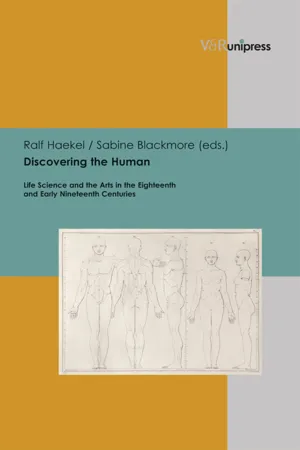
Discovering the Human
Life Science and the Arts in the Eighteenth and Early Nineteenth Centuries
- 204 pages
- English
- PDF
- Available on iOS & Android
Discovering the Human
Life Science and the Arts in the Eighteenth and Early Nineteenth Centuries
About This Book
'Discovering the Human' investigates the emergence of the modern human sciences and their impact on literature, art and other media in the 18th and 19th centuries. Up until the 1830s, science and culture were part of a joint endeavour to discover and explore the secret of life. The question 'What is life?' unites science and the arts during the Ages of Enlightenment and Romanticism, and at the end of the Romantic period, a shift of focus from the human as an organic whole to the specialized disciplines signals the dawning of modernity. The emphasis of the edited collection is threefold: the first part sheds light on the human in art and science in the Age of Enlightenment, the second part is concerned with the transitions taking place at the turn of the 19th century. The chapters forming the third part investigate the impact of different media on the concept of the human in science, literature and film.
Frequently asked questions
Information
Table of contents
- Title Page
- Copyright
- Table of Contents
- Body
- Ralf Haekel & Sabine Blackmore: Discovering the Human – An Introduction
- I. Eighteenth-Century Science and the Arts
- Christoph Heyl: William Hogarth, Science and Human Nature
- Mascha Hansen: Scientifick Wives – Eighteenth-Century Women Between Self, Society and Science
- Sladja Blazan: Immanuel Kant's “One Great Republic” – From Spirit Theory to Moral Philosophy
- II. Romantic Science and the Arts
- Catherine Clinger: Speleological Interiority – The Mindfulness of a Spelunking Anatomist
- Ulrike Kristina Köhler: Ann Radcliffe's Gothic – A Subtle Plea for Female Education in the Arts and in the Sciences
- Felix C.H. Sprang: The Rise of the “Life Sciences” and the Dismissal of Plant Life in the Late Eighteenth and Early Nineteenth Centuries
- III. The Human and Media Change
- Hania Siebenpfeiffer: (Imagining) First Contact – Literary Encounters of the Extraterrestrial Other in Seventeenth- and Eighteenth-Century Novels
- Helga Schwalm: Lives of the Physicians – Samuel Johnson, Medicine and Biography
- Birgit Mara Kaiser: Electrified Humans – Of Inhuman Affects in Heinrich von Kleist
- Ute Berns: Artificial Life, Science and Reflexivity in James Whale's Frankenstein